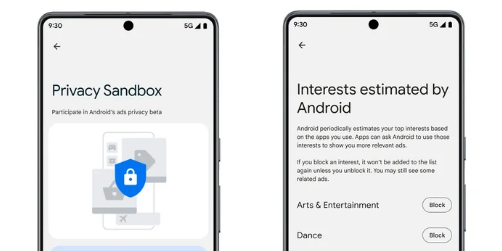
The digital world is a dangerous place and that will probably never change. But that shouldn’t have to ruin our whole experience using our favorite apps and platforms.
Google wants to give us peace of mind in this regard. A number of initiatives that give Android users a lot more control over their privacy and security have been announced, and we couldn’t be more relieved.
Let’s take a look at some of the innovations designed to protect our data.
Google’s data safety initiatives
Relevant content, but more privacy
Say goodbye to being creeped out by the ads and content your smartphone suggests!
Last year, Google announced the so-called Privacy Sandbox. Its main purpose is to keep the advertising relevant without relying on cross-app trackers. That way, neither your user experience nor the interests of businesses are compromised, but the protection of your data is stronger.
Developers have already begun the efforts of building this technology on the web, but now we know for sure they’re implementing it onto Android as well.
As of February this year, a small number of devices running Android 13 have been getting the chance to test Privacy Sandbox Beta. If you’re one of the lucky ones, you’ll get a notification letting you know your device is eligible.
With this implementation, you’ll be able to set your interests and block topics that are irrelevant to you. So, you can keep seeing content you actually care about while feeling a lot safer thanks to the limited data sharing with third parties. Looks like a total win-win situation!
More Google Play protection
Google Play has been introducing a number of improvements to transparency and data protection over the recent years, and that trend is going to continue.
Google announced a new data deletion policy that should take effect by the end of this year. For apps that require account creation, users will be able to request account and data deletion from within the app as well as on the web.
So, say you uninstall an app, but then decide to delete the account associated with it – you won’t have to reinstall the app to do so. If you don’t want to delete everything, you’ll be able to select which data you want gone.
Moreover, according to the Android Developers Blog, if an app needs to retain some of your data “for legitimate reasons such as security, fraud prevention, or regulatory compliance”, this will be openly stated. And finally, applications will only be collecting data that’s absolutely necessary for maximum functionality and user experience.
Finally, Google has also continued improving the Play Integrity API, which helps battle unauthorized access to apps. It’s an effective measure against abuse and malicious attacks and it’s great to see that it’s being streamlined consistently.
P.S. Bonus tip for your cybersecurity:
To further enhance protection, it’s also important to ensure that all devices you use are equipped with up-to-date antivirus software to detect and prevent potential malware threats.
Enhanced child safety
Children are especially vulnerable when it comes to online privacy and security. That’s why Google Play already has quite a few policies in place that developers need to comply with if their apps are made for kids.
However, since this is such a crucial issue, Google will continue to update and enhance those regulations. Ultimately the goal is to help parents rest assured that the applications they download for their kids are perfectly safe for them to use.
What about Android 14?
These initiatives are already being prepared for the current Android OS. But will Android 14 bring any other data safety innovations on top of these?
From what we know so far, Android 14 is definitely bringing quite a few cool features and tweaks to the table. And some of those improvements are indeed targeting privacy and security. As for data protection specifically, one big change we can expect Google to make with the new OS is related to data use transparency.
Basically, with the Google Play data safety form that’s already in place, users know what data they’re disclosing, but not always why. Moreover, this information is only visible in the app’s Google Play listing, which makes it easy to miss.
With Android 14, this should change. All information on what data an app needs and for what purpose will now most likely be visible in the OS itself. Furthermore, if an app makes any changes to their data use, you will know.
To add another layer of protection to your data, Android 14 will also include a feature that limits information exchange between different apps. Also, it’ll be impossible to download older apps, since they’re more vulnerable to potential malware attacks.
Summary
With online threats being more present than ever, it’s very comforting to see all these steps Google is taking to validate and address all security concerns. What’s also really awesome is that this isn’t happening at the expense of developers and businesses. Google really strives to find a balance and support developers while also ensuring a more transparent and trustworthy experience for us users.
What safety initiatives could be next? We’ll stay tuned and let you know


